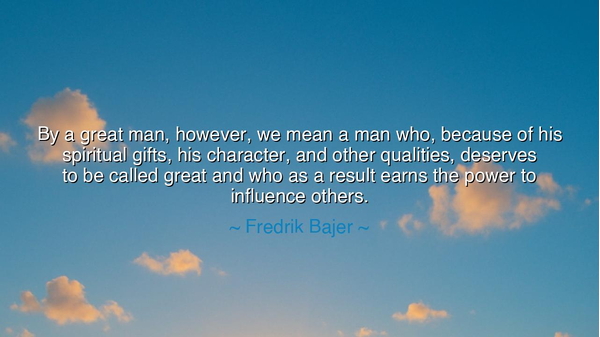
By a great man, however, we mean a man who, because of his
By a great man, however, we mean a man who, because of his spiritual gifts, his character, and other qualities, deserves to be called great and who as a result earns the power to influence others.






Fredrik Bajer, soldier turned statesman, peacemaker and Nobel laureate, spoke these words with the solemnity of one who knew the cost of both war and peace: “By a great man, however, we mean a man who, because of his spiritual gifts, his character, and other qualities, deserves to be called great and who as a result earns the power to influence others.” Here he cuts away the false crowns of power, wealth, and birth, and declares that true greatness rests not on possession, but on the soul’s spiritual gifts and the strength of character.
The meaning is both clear and eternal. Many are called great because they command armies, amass riches, or rule nations. Yet Bajer reminds us that these are but shadows of greatness if not joined with virtue. True greatness cannot be bought, inherited, or imposed by fear; it must be earned by the quality of one’s spirit, the nobility of one’s actions, and the depth of one’s moral being. Only then does a man gain the rightful power to influence others, not by compulsion, but by the force of his example.
History gives us radiant examples. Consider Mahatma Gandhi, frail in body yet mighty in soul. He commanded no armies, wore no crown, and carried no scepter, yet his spiritual gifts—patience, humility, and moral courage—shook an empire and inspired millions to seek freedom through peace. Gandhi was a “great man” in Bajer’s sense, for his character itself became a banner that others followed willingly. His influence did not spring from coercion but from the reverence he inspired.
This lesson is also a warning. Many who seem great in their time are unmasked by history as tyrants, for their influence rested only on fear. Their monuments crumble, their names are cursed, and their “greatness” dies with them. But the greatness of those who live by wisdom, virtue, and character endures, for it is rooted not in the shifting sands of fortune, but in the eternal soil of truth.
Therefore, let the seeker of wisdom strive not for titles or applause, but for the cultivation of the soul. Let him grow in compassion, discipline, humility, and courage. For only then will he wield the power that matters—the power to awaken, to inspire, to lift others upward. Bajer’s words stand as a clarion call across the generations: true greatness is not in dominion, but in the influence of virtue, which shines brighter than crowns, stronger than armies, and more enduring than empires.






CBChien Bui
I admire how this statement redefines greatness as something grounded in the spirit rather than external achievement. Yet, it makes me question how we identify such qualities in others. Can greatness be objectively recognized, or is it always subjective and culturally shaped? History is full of figures once praised as great who are later re-evaluated. Perhaps Bajer’s view reminds us that true greatness must endure beyond temporary admiration or worldly success.
DTMinh Dinh Trong
This quote resonates with me because it ties greatness to deserving influence rather than simply possessing it. It implies that leadership is something earned, not inherited or seized. But it also raises a question—can greatness exist without public recognition? If a person lives with deep virtue and spiritual insight but never gains influence, are they still ‘great’ in Bajer’s sense? Maybe greatness is more about inner worth than visible impact.
DMPhuong Do minh
I find this definition of greatness both inspiring and demanding. It suggests that moral character and spiritual wisdom are prerequisites for real influence. But can influence itself corrupt those very qualities? Many people start with noble intentions but lose their way once they gain authority. I’d love to explore whether greatness should be measured by what one achieves or by how faithfully one remains true to higher principles while leading others.
GTGiang Thu
This quote makes me think deeply about what true greatness really means. Bajer seems to separate greatness from fame or power, grounding it instead in spiritual and moral qualities. But I wonder, in today’s world, do we still value those traits as much as charisma or success? It feels like society often confuses influence with virtue. Can someone truly be called great if their power doesn’t stem from integrity and inner strength?